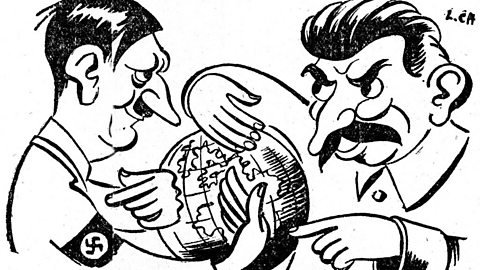The Deceptions of Marx and Hitler: Utopian Lies and Contradictory Ideologies

Sources: https://www.bbc.co.uk/teach/articles/zhv747h
Karl Marx and Adolf Hitler, two figures whose ideologies shaped the 20th century, built their visions on promises that were not just impractical but fundamentally deceitful. Both offered utopian dreams—Marx with his stateless, classless society and Hitler with his racially "pure" National Socialism—but their rhetoric masked contradictions and paved the way for totalitarianism. This blog dives into the lies at the heart of their ideologies, supported by historical evidence, and explains why their promises were doomed to fail.
Marx’s Mirage: The Withering State
Karl Marx, alongside Friedrich Engels, envisioned a communist utopia where a totalitarian state would enforce equality and then "wither away," leaving a classless, stateless society. This idea, articulated in The Communist Manifesto (1848), was a lie. Historical implementations of Marxism, such as in the Soviet Union under Lenin and Stalin, showed no sign of the state dissolving. Instead, power centralized in the hands of elites, with the state expanding its control through surveillance and repression. As historian Richard Pipes notes in The Russian Revolution (1990), the Bolshevik state grew into a bureaucratic behemoth, contradicting Marx’s promise of a stateless future (Pipes, 1990, p. 389).
The notion of a state voluntarily relinquishing power defies political reality. Once entrenched, regimes like those in Maoist China or Castro’s Cuba perpetuated control, crushing dissent in the name of "equality." Marx’s utopia was not just naive; it was a deliberate sleight of hand, promising liberation while delivering chains.
Hitler’s False Facade: Individualism Under National Socialism
Adolf Hitler presented National Socialism as a defender of individual rights and private property, rallying Germans around a racially superior "Aryan" nation. Yet, under the National Socialist regime, private property was illusory. The state controlled industries through policies like the Four-Year Plan, dictating production and subordinating personal wealth to its war machine. As economic historian Adam Tooze details in The Wages of Destruction (2006), the National Socialist economy was a "command economy" where private enterprises served state goals, not individual interests (Tooze, 2006, p. 204).
Individualism was equally impossible. The National Socialist regime demanded total loyalty to the collective "Volk," orchestrating every facet of life—economic, social, and personal. Hitler’s vision of conquering Eastern resources to bring "full socialism" to Aryans, as outlined in Mein Kampf (1925), revealed his collectivist core (Hitler, 1925, p. 403). The state’s obsession with racial unity suppressed personal ambition, reducing individuals to cogs in a collective machine.
The Contradiction of Collectivism and Individualism
Hitler’s ideology harbored a fatal contradiction: you cannot champion both collectivism and individualism. National Socialism required the collectivization of the masses under a singular racial identity, as seen in propaganda glorifying the "Aryan community." Yet, Hitler also embraced Social Darwinism, the "survival of the fittest," which implies individual competition. This concept, rooted in Herbert Spencer’s work and adapted by National Socialist ideologues, clashed with collectivism (Hawkins, 1997, p. 277).
If Social Darwinism were fully applied, Aryan "supermen" would compete ruthlessly, undermining the racial unity Hitler sought. A society of individuals striving for personal dominance cannot coexist with a state demanding conformity. This paradox, as historian Ian Kershaw notes in Hitler: A Biography (2008), exposed the incoherence of National Socialist ideology, which oscillated between collective discipline and individual aggrandizement (Kershaw, 2008, p. 347).
The Shared Sin: Utopian Deception
Marx and Hitler, though ideologically opposed, shared a reliance on utopian lies. Marx’s stateless society ignored the realities of power, while Hitler’s promises of individual freedom crumbled under collectivist control. Both required totalitarianism to enforce their visions, betraying their rhetoric. The Soviet Union’s gulags and National Socialist concentration camps stand as grim testaments to this deception.
Their ideologies also dismissed the individual. Marx subordinated personal freedom to class struggle, while Hitler sacrificed it for racial purity. Neither could reconcile their promises with the oppressive mechanisms needed to achieve them, as evidenced by the millions who suffered under their regimes.
Conclusion: The Danger of Utopian Lies
The legacies of Marx and Hitler warn against the seductive power of utopian promises. Ideologies that demand absolute control while promising paradise are inherently flawed. They thrive on contradictions and deception, offering freedom while delivering tyranny. By examining the lies of Marx and Hitler, supported by historical evidence, we see the peril of sacrificing reason for rhetoric and the individual for the collective. True progress lies in embracing reality—flawed, messy, and human.
Sources
- Hitler, A. (1925). Mein Kampf. Munich: Eher Verlag.
- Hawkins, M. (1997). Social Darwinism in European and American Thought, 1860–1945. Cambridge: Cambridge University Press.
- Kershaw, I. (2008). Hitler: A Biography. New York: W.W. Norton & Company.
- Marx, K., & Engels, F. (1848). The Communist Manifesto. London: Workers’ Educational Association.
- Pipes, R. (1990). The Russian Revolution. New York: Knopf.
- Tooze, A. (2006). The Wages of Destruction: The Making and Breaking of the Nazi Economy. London: Allen Lane.
Hitler has already been judged by history as a villain. To continue siding with him is now dismissed as unpopular. But not with Marx. He is still considered an authority when it comes to socio-economic analysis. That speaks volumes about the current state of the academic community these days.
!PIZZA
!LOLZ
$PIZZA slices delivered:
@arcelcalvin9(2/5) tipped @greywarden100
Come get MOONed!